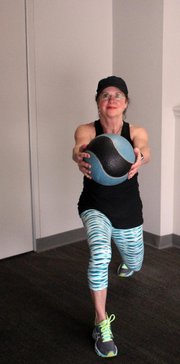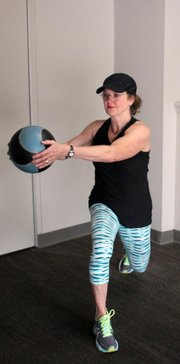Knee health is an area of interest for many exercisers, particularly those who have a history of injuries or pain.
The trouble is, few people understand that the mechanics and supportive structures of the knee can weaken over time, and they let their knee care slide.
This week, I'll shed some light on developing a knee health program that's safe, effective and easy to follow.
The first rule of the knee health program (or any fitness program) is to do no harm. Therefore it's important to assess your knee stability before embarking on your new routine.
Do your knees hurt right now? Don't try to "fix" them without professional help. Assuming they don't, have you had knee injuries? Do certain activities make your knees hurt? These are smart questions to ask yourself before getting started.
Assuming your knees are healthy, you want to work on strength and flexibility of the big muscles of the thigh, at angles that don't place great pressure on the knee itself; and I recommend starting with very small movements and building slowly.
One of my favorite knee-strengthening exercises is the ministep. In this movement, you select an aerobics step with no risers and place one foot on the step. Moving quickly, you just tap the opposite toe to the floor rapidly for 25 repetitions. This will really challenge the muscles that support the knee, especially the vastus medialis portion of the quadriceps.
Another key element of a solid knee health program is stretching. You must keep the quadriceps, hip flexors and hamstrings flexible and loose to reduce knee pressure. A simple static stretching routine that addresses these muscle groups three to four times a week will be more than enough to keep you moving in the right direction.
The final element that directly affects knee health is using good judgment with ballistic activities.
Most knee injuries occur during quick changes of direction, as seen in basketball or softball. As we age, we tend to let our supportive structures weaken to the point that these routine changes of direction can result in a catastrophic knee injury. To avoid this, limit ballistic activities until knee stability improves to a level that supports doing such movements on a regular basis. While this is a moving target for each individual, everyone needs to use good judgment and work up to doing these activities slowly.
The classic mistake occurs when a weekend warrior (whose knee stability has been compromised by sitting all day at work) leaps into a hot game of pickup hoops with the guys from the office.
This week's exercise is a great way to increase knee stability through strength training. The Medicine Ball Twist Lunge is an easy exercise that's appropriate for almost all fitness levels.
1. Select a medium-weight medicine ball and grasp it with both hands. Extend the ball out in front of the chest while standing with your feet together.
2. Step forward with the right foot, and as you begin to lunge down, twist your shoulders to the right. Simultaneously twist while you lunge down.
3. When you reach the bottom of your lunge, the medicine ball should be nearly even with your right shoulder.
4. Stand back up by extending the right leg and bringing the left foot forward. As you do this, rotate back to the center with the medicine ball.
5. Repeat this movement with the left leg while rotating the torso to the left side.
6. Continue alternating sides until you've done 12 in a row.
7. Perform two sets.
This exercise will really address knee stability because of the twisting element. The supportive ligaments and tendons will have a chance to support a little bit of side-to-side pressure in a way that's very controlled, which is exactly what helps to prepare the knee for future events.
It's a great way to get started.
Matt Parrott has a doctorate in education (sport studies) and a master's in kinesiology and is certified by the American College of Sports Medicine.
ActiveStyle on 12/26/2016



